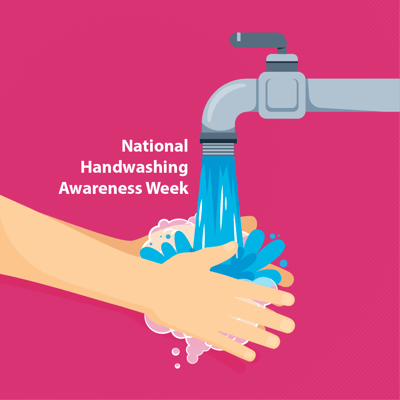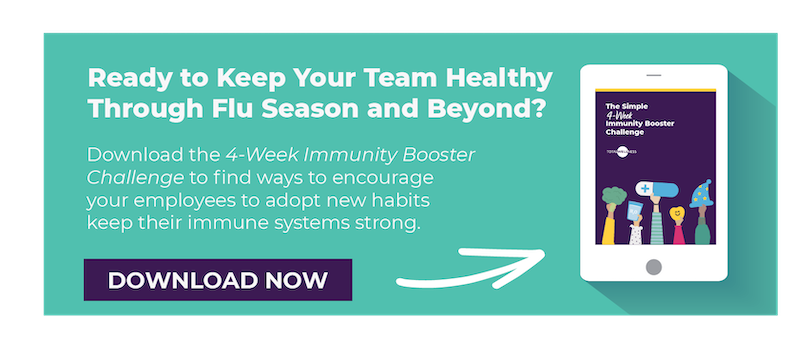 There’s no denying handwashing prevents the spread of germs.
There’s no denying handwashing prevents the spread of germs.
Between the pandemic and flu season, National Handwashing Awareness Week — which is December 1 through the 7 — is the ideal time to discuss the importance of handwashing at work.
Intentional handwashing is one of the best ways to protect yourself and your employees from getting sick.
This week, consider taking some time to share handwashing facts while letting your employees participate in fun handwashing awareness activities.
Below, you’ll find interesting facts and creative activities to share and get your employees excited about handwashing.
How to Observe National Handwashing Awareness Week
Before cold and flu season spikes, now is a great time to remind your employees of why handwashing is a must. Not only does it keep individuals from getting sick, but it also stops the quick spread of contagious illnesses in the workplace, too.
As an employer, there are a few ways to observe National Handwashing Awareness Week:
- Email out content - You can keep it simple by copying and pasting handwashing content like what we’ve shared below.
- Participate in fun activities - We’ve listed creative ways to engage your employees on the topic of handwashing with the ideas down below. Soap making demo, anyone?
- Share a handwashing video - Some people need a refresher on how to suds up. Forward this video from SIU Medicine on proper handwashing techniques to your team.
However your company chooses to observe it, driving home the point of keeping clean hands at all times is the most important message to share. Help remind your employees why this regular habit can keep them well throughout the year.
When Should I Wash My Hands?
These days, you probably feel like you spend half of your time washing your hands. But, for good reason — it keeps you healthy and prevents the spread of serious illnesses like COVID-19 and the flu.
Key times to wash your hands:
- Before eating
- After touching garbage
- After using the bathroom
- After handling pet food or pet treats
- If your hands are visibly dirty or greasy
- Before and after treating a cut or wound
- Before, during, and after preparing food
- After touching an animal, animal feed, or animal waste
- Before and after caring for someone at home who is sick
- After changing diapers or cleaning up a child who has used the toilet
Additionally, any time you blow your nose, cough, or sneeze, immediately clean your hands by either washing them with soap and water or using hand sanitizer with 60% alcohol or more.
Handwashing and Hand Hygiene Facts to Share
With the current COVID pandemic going on, we all have heard the importance of handwashing for the last several months. Now with the cold and flu season in full swing, it’s more important than ever that employees grasp the necessity of thorough handwashing.
To drive the point home, consider sharing these handwashing facts this week:
Handwashing Prevents the Spread of Illness
Handwashing with soap removes germs from hands that can make you and others ill. Without even realizing it, most of us touch our face, eyes, mouth, and nose often throughout the day. This is where germs can make their entrance into our bodies and make us ill.
Soap is Soap
Over the years, there’s been much debate and clever marketing around which soap is the best soap to squash germs. Both bar and liquid soap work well. Studies indicate there’s no added benefit to using antibacterial soap with the exception of those who work in healthcare settings. In fact, the FDA banned over-the-counter sale of antibacterial soaps with certain ingredients (triclosan and triclocarban) back in 2016 since they weren’t proven to be effective in keeping people from getting sick.
Germs Spread Quickly Onto Surfaces
Unwashed hands can transfer germs to other objects, like handrails, tabletops, desks, phones, and other objects before being transferred to another person’s hands. Desktops in particular are quite germ-covered. Most were found to have 400 times more germs than even a toilet seat! That’s why sanitizing frequently in your office and home is essential along with regular handwashing to minimize the spread of germs.
Handwashing Helps Against Antibiotic Resistance
When you wash your hands well and often, it prevents sickness that might otherwise be treated with antibiotics. When antibiotics are used too frequently, it causes a resistance that doesn’t allow the antibiotics to work as effectively the next time around they’re needed. Around 20% of respiratory infections (like colds) and 30% of diarrhea-related illnesses can be prevented by effective handwashing, according to the U.S. Department of Health & Human Services.
Scrub for a Minimum of 20 Seconds
Handwashing isn’t effective if you don’t do it for a long enough time. At a minimum, you want to scrub your hands with clean, warm, and soapy water for at least 20 seconds. You can hum the “Happy Birthday” song twice to ensure you do it long enough. Or, switch it up with some other 30-second choruses from Queen or Beyoncé if you’re tired of the traditional birthday jam.
Can’t get to a sink? Use an alcohol-based sanitizer in the meantime. To prevent the spread of germs during the COVID-19 pandemic, use a hand sanitizer with at least 60% alcohol.
National Handwashing Awareness Week Activities
Handwashing talks don’t have to be boring. In fact, this week you can try a variety of activities that remind employees of the importance of handwashing without driving them crazy.
Give these creative National Handwashing Awareness Week activities a try:
Pass Out Hand Soaps
If you can find enough soap in stores for your team, consider gifting them liquid or bar soap along with a reminder that it’s National Handwashing Awareness Week.
Bonus idea: Want to support a local business during these difficult times? Order from a local soap maker. You’ll keep your employees from spreading germs and support a local business owner — it’s a win-win!
Offering a Helping Hand
It’s been a tough year for a lot of nonprofits. Consider creating a give back campaign around handwashing. Contact a local homeless shelter and donate soap and other hygiene products on behalf of your company. You may even wish to include little cards with hygiene hand facts.
Host a Soap Making Demo
For the creatives in your workplace, consider hosting a soap-making workshop. Have a volunteer host the class (virtually or in-person while socially distanced) or ask a local soap maker to come in and teach the course. Don’t forget to include a handwashing demo. Everyone will leave with a new appreciation for soap making and handwashing!
Bonus idea: Cover the cost of supplies for the class and then have participants pay a small fee. All proceeds can then be donated to a favorite local charity or go toward purchasing soap for a local homeless shelter.
Give Away “Keep it Clean” Gifts
Surprise your employees with a handwashing awareness gift basket. Package up soap, hand sanitizer, tissues, and a mini packet of bleach wipes with a printout of handwashing and hygiene facts.
Handwashing Display Contest
Have your employees design fun and creative tissue box or paper towel displays to place throughout the workplace to remind team members to wash their hands. Or, display them in various bathrooms throughout your workplace. You can also have employees digitally vote for their favorite one and display the winning design front and center in your office.
How do you participate in National Handwashing Awareness Week in the workplace? Share your activities and ideas in the comments below!



